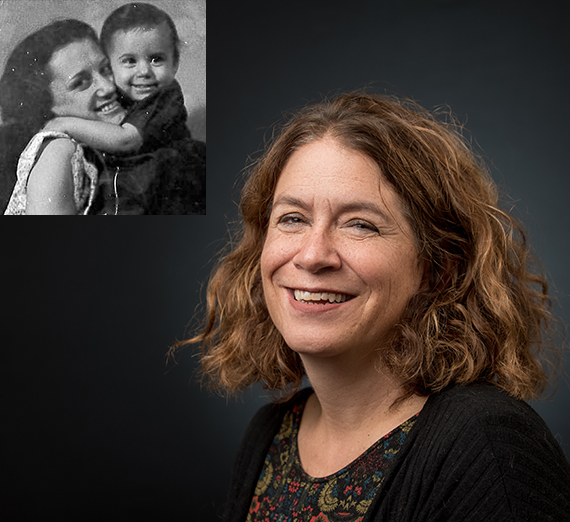Pride at the Poll

In 1983 during the run-up to his re-election campaign, President Ronald Reagan visited Harry S Truman High School in Independence, Mo. Just before his motorcade passed my school, our teachers sent us outside to the sidewalk to cheer for our illustrious visitor. I instead turned my back to the long black car as it passed. I wasn’t old enough to vote legally, but I remember feeling like I had cast my first ballot. I felt powerful.
Mine was not an overtly political family. We didn’t talk policy at the dinner table. My parents never protested the Vietnam War or marched for the Equal Rights Amendment. But their Midwestern aversion to emotional display should not be mistaken for apathy. They voiced their concerns in private – at the ballot box.
My steely grandma, born nearly a decade before suffrage, kept quiet in the company of her domineering husband, but she proudly wore her “I voted” sticker on election day. She never disclosed her choices. “That’s between me and my ballot,” she’d tell me when I pressed. My mother, diagnosed with juvenile arthritis at 16, pulled on her heavy braces, made her slow way to the car, and drove herself to the little church near our home that served as our polling place. She, too, kept her choices to herself.
Unlike my family matriarchs, I have never been quiet about my politics. When I was nine, I taped a note to my neighbor’s flagpole that demanded he take down his Confederate flag. I gleefully called my mom within minutes of casting my first ballot – for Michael Dukakis. During my years as a journalist, I disagreed with colleagues who said they never voted because of concerns about perceived bias. I’d counter that I could help make decisions about my community AND be fair.
The first election after my daughter’s birth, I carried her into the polling place, balancing her on my hip as I pushed the thick pin through the paper ballot. When her twin brothers arrived a few years later, I hauled all three into the tiny space and pulled shut the half curtain. As they grew older, I told them about countries where people waited days to casts ballots while we voted, at least in Spokane County, within minutes. The effort required – the corralling of kids, the driving, the parking – helped give voting the feel of meaningful ritual, alive with the rich history of previous elections and the promise of those to come.
In these days of voting by mail, I fill in the ballot’s ovals with my black ink pen while sitting at my dining room table, and I think about my mom and my grandma and the complicated reasons they stayed mum about their ballots’ contents. I suspect they knew their husbands would disagree with their choices. Their votes were their own, but they understood the fragility of that right. They kept quiet. Now I don’t have to.
Mine was not an overtly political family. We didn’t talk policy at the dinner table. My parents never protested the Vietnam War or marched for the Equal Rights Amendment. But their Midwestern aversion to emotional display should not be mistaken for apathy. They voiced their concerns in private – at the ballot box.
My steely grandma, born nearly a decade before suffrage, kept quiet in the company of her domineering husband, but she proudly wore her “I voted” sticker on election day. She never disclosed her choices. “That’s between me and my ballot,” she’d tell me when I pressed. My mother, diagnosed with juvenile arthritis at 16, pulled on her heavy braces, made her slow way to the car, and drove herself to the little church near our home that served as our polling place. She, too, kept her choices to herself.
Unlike my family matriarchs, I have never been quiet about my politics. When I was nine, I taped a note to my neighbor’s flagpole that demanded he take down his Confederate flag. I gleefully called my mom within minutes of casting my first ballot – for Michael Dukakis. During my years as a journalist, I disagreed with colleagues who said they never voted because of concerns about perceived bias. I’d counter that I could help make decisions about my community AND be fair.
The first election after my daughter’s birth, I carried her into the polling place, balancing her on my hip as I pushed the thick pin through the paper ballot. When her twin brothers arrived a few years later, I hauled all three into the tiny space and pulled shut the half curtain. As they grew older, I told them about countries where people waited days to casts ballots while we voted, at least in Spokane County, within minutes. The effort required – the corralling of kids, the driving, the parking – helped give voting the feel of meaningful ritual, alive with the rich history of previous elections and the promise of those to come.
In these days of voting by mail, I fill in the ballot’s ovals with my black ink pen while sitting at my dining room table, and I think about my mom and my grandma and the complicated reasons they stayed mum about their ballots’ contents. I suspect they knew their husbands would disagree with their choices. Their votes were their own, but they understood the fragility of that right. They kept quiet. Now I don’t have to.
